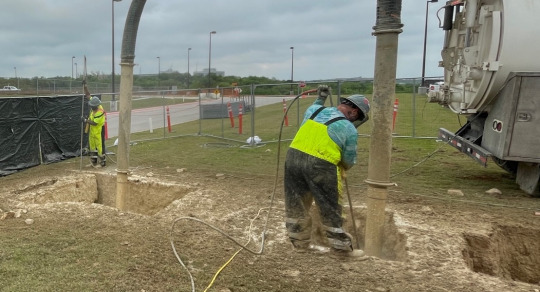Professional HydroVac Excavation and Industrial Vacuum Contractor, Dedicated to Serving Central and South Texas, https://precise-contractors.com/
Don't wanna be here? Send us removal request.
Text
Precision and Professionalism: Introducing Precise Contractors' Hydro-Excavation Services

In the realm of construction and excavation, precision and professionalism are paramount. When it comes to delicate or complex projects that demand the utmost care, expertise, and efficiency, one name stands out: Precise Contractors. With a commitment to excellence and a track record of delivering top-tier services, Precise Contractors offers a range of hydro-excavation services that redefine industry standards.
Why Hydro-Excavation?
Hydro-excavation, often referred to as hydrovac or vacuum excavation, is a cutting-edge method that utilizes pressurized water and a powerful vacuum system to precisely excavate soil and debris. Unlike traditional excavation methods that rely on heavy machinery and manual labor, hydro-excavation offers a safer, more efficient, and environmentally friendly alternative.
The Precision Advantage
At Precise Contractors, precision is more than just a buzzword – it's a guiding principle that informs every aspect of their hydro-excavation services. Equipped with state-of-the-art technology and staffed by highly skilled technicians, Precise Contractors ensures that each excavation project is executed with pinpoint accuracy and meticulous attention to detail.
Professionalism in Practice
Professionalism is at the core of everything Precise Contractors does. From the initial consultation to project completion, clients can expect transparent communication, adherence to deadlines, and a steadfast commitment to quality. With a focus on customer satisfaction and safety, Precise Contractors maintains the highest standards of professionalism at every stage of the excavation process.
Comprehensive Services
Whether it's daylighting utilities, trenching, potholing, or debris removal, Precise Contractors offers a comprehensive suite of hydro-excavation services tailored to meet the unique needs of each project. With the versatility to handle projects of any scale or complexity, Precise Contractors is the go-to choice for contractors, developers, municipalities, and industrial clients alike.
Environmental Responsibility
In an era of increasing environmental awareness, sustainability is non-negotiable. Recognizing the importance of minimizing environmental impact, Precise Contractors prioritizes eco-friendly practices in all aspects of their operations. By utilizing hydro-excavation techniques that minimize soil disturbance and reduce the risk of utility damage, Precise Contractors demonstrates a steadfast commitment to environmental responsibility.
The Promise of Excellence
At Precise Contractors, excellence isn't just a goal – it's a promise. With a relentless dedication to innovation, integrity, and customer satisfaction, Precise Contractors continues to set the standard for hydro-excavation services. Whether it's unlocking new possibilities in excavation technology or exceeding client expectations, Precise Contractors is driven by a singular vision: to deliver precision and professionalism with every project, every time.
In the dynamic world of construction and excavation, Precise Contractors stands as a beacon of reliability, expertise, and excellence. With their unrivaled commitment to precision and professionalism, Precise Contractors is not just shaping the landscape – they're redefining what it means to excel in hydro-excavation services.
#hydro excavation services near me#hydro excavation near me#Line Location#vacuum excavation contractors near me#Vacuum Excavation#trenching services#trenching contractor near me
0 notes
Text
Vacuum Excavation Services - Precise Contractors
What is vacuum excavation used for?
Vacuum excavation, also known as hydro excavation or soft digging, is a non-destructive digging method that uses high-pressure water or air to break up soil, and a vacuum system to remove the debris. This technique is commonly used for various purposes in construction, utility maintenance, and other industries. Some of the key applications of vacuum excavation include:

Utility Locating and Exposure:
Safe Excavation around Utilities: Vacuum excavation is often used to safely expose and locate underground utilities such as water pipes, gas lines, electrical cables, and telecommunications cables. This helps prevent damage to these critical infrastructure elements during construction or excavation projects.
Potholing:
Utility Potholing: Contractors use vacuum excavation to create small, precise holes (potholes) to visually inspect and verify the location of buried utilities before conducting any major excavation work. This reduces the risk of accidental damage to underground infrastructure.
Trenching:
Trenching for Utilities: Vacuum excavation is employed for creating trenches needed for installing utilities. The non-destructive nature of the process reduces the likelihood of damaging existing utilities in the vicinity.
Debris Cleanup:
Spill Cleanup: Vacuum excavation is useful for cleaning up spills or removing loose materials in industrial settings. The vacuum system efficiently collects and transports debris without disturbing the surrounding environment.
Environmental Sampling:
Soil Sampling: Vacuum excavation can be used for collecting soil samples in an environmentally sensitive manner, without causing contamination or disturbance to the surrounding area.
Slot Trenching:
Narrow Trenching: In situations where a narrow trench is required, such as for installing small pipes or cables, vacuum excavation provides a precise method for creating these narrow slots without causing unnecessary disruption.
Cold Weather Excavation:
Frozen Ground Excavation: Vacuum excavation is particularly useful in cold climates where the ground may be frozen. The high-pressure water or air can break up the frozen soil, and the vacuum system can remove the material.
Archaeological Excavation:
Sensitive Excavation: In archaeological applications, vacuum excavation is used for delicate and precise excavation around artifacts to avoid damage.
Overall, vacuum excavation is chosen for its precision, safety, and environmental benefits compared to traditional mechanical digging methods. It minimizes the risks associated with damaging underground infrastructure and reduces the environmental impact of excavation projects.
#trenching services#hydro excavation services near me#hydro vac service near me#hydrovac contractors#trenching contractor near me#hydrovac solutions#vacuum excavation contractors near me#hydrovac excavation companies near me#hydro contractors#hydro excavation near me
2 notes
·
View notes